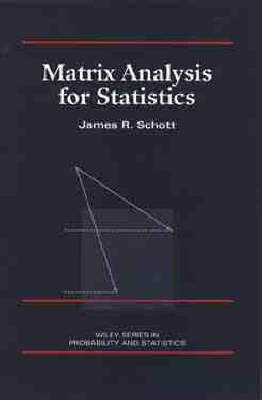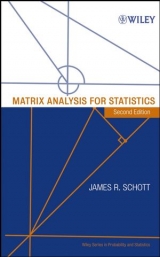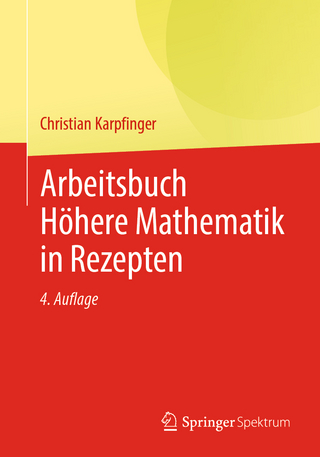
Matrix Analysis for Statistics
Seiten
1996
John Wiley & Sons Inc (Verlag)
978-0-471-15409-9 (ISBN)
John Wiley & Sons Inc (Verlag)
978-0-471-15409-9 (ISBN)
- Titel ist leider vergriffen;
keine Neuauflage - Artikel merken
Zu diesem Artikel existiert eine Nachauflage
This text gives a mathematical development of the matrix theory and methods most commonly used in statistical application. The subject-matter is written primarily in a theorem-proof format.
A complete, self-contained introduction to matrix analysis theory and practice Matrix methods have evolved from a tool for expressing statistical problems to an indispensable part of the development, understanding, and use of various types of complex statistical analyses. As such, they have become a vital part of any statistical education. Unfortunately, matrix methods are usually treated piecemeal in courses on everything from regression analysis to stochastic processes. Matrix Analysis for Statistics offers a unique view of matrix analysis theory and methods as a whole. Professor James R. Schott provides in-depth, step-by-step coverage of the most common matrix methods now used in statistical applications, including eigenvalues and eigenvectors, the Moore-Penrose inverse, matrix differentiation, the distribution of quadratic forms, and more. The subject matter is presented in a theorem/proof format, and every effort has been made to ease the transition from one topic to another. Proofs are easy to follow, and the author carefully justifies every step.
Accessible even for readers with a cursory background in statistics, the text uses examples that are familiar and easy to understand. Other key features that make this the ideal introduction to matrix analysis theory and practice include: * Self-contained chapters for flexibility in topic choice. * Extensive examples and chapter-end practice exercises. * Optional sections for mathematically advanced readers.
A complete, self-contained introduction to matrix analysis theory and practice Matrix methods have evolved from a tool for expressing statistical problems to an indispensable part of the development, understanding, and use of various types of complex statistical analyses. As such, they have become a vital part of any statistical education. Unfortunately, matrix methods are usually treated piecemeal in courses on everything from regression analysis to stochastic processes. Matrix Analysis for Statistics offers a unique view of matrix analysis theory and methods as a whole. Professor James R. Schott provides in-depth, step-by-step coverage of the most common matrix methods now used in statistical applications, including eigenvalues and eigenvectors, the Moore-Penrose inverse, matrix differentiation, the distribution of quadratic forms, and more. The subject matter is presented in a theorem/proof format, and every effort has been made to ease the transition from one topic to another. Proofs are easy to follow, and the author carefully justifies every step.
Accessible even for readers with a cursory background in statistics, the text uses examples that are familiar and easy to understand. Other key features that make this the ideal introduction to matrix analysis theory and practice include: * Self-contained chapters for flexibility in topic choice. * Extensive examples and chapter-end practice exercises. * Optional sections for mathematically advanced readers.
JAMES R. SCHOTT, PhD, is a professor in the Department of Statistics at the University of Central Florida.
A Review of Elementary Matrix Algebra. Vector Spaces. Eigenvalues and Eigenvectors. Matrix Factorizations and Matrix Norms. Generalized Inverses. Systems of Linear Equations. Special Matrices and Matrix Operators. Matrix Derivatives and Related Topics. Some Special Topics Related to Quadratic Forms. References. Index. List of Series Titles.
| Erscheint lt. Verlag | 5.11.1996 |
|---|---|
| Reihe/Serie | Wiley Series in Probability & Statistics: Applied Probability & Statistics Section |
| Zusatzinfo | index |
| Verlagsort | New York |
| Sprache | englisch |
| Maße | 160 x 240 mm |
| Gewicht | 822 g |
| Themenwelt | Mathematik / Informatik ► Mathematik ► Algebra |
| Mathematik / Informatik ► Mathematik ► Angewandte Mathematik | |
| Mathematik / Informatik ► Mathematik ► Statistik | |
| ISBN-10 | 0-471-15409-1 / 0471154091 |
| ISBN-13 | 978-0-471-15409-9 / 9780471154099 |
| Zustand | Neuware |
| Haben Sie eine Frage zum Produkt? |
Mehr entdecken
aus dem Bereich
aus dem Bereich
Buch | Softcover (2022)
Springer Spektrum (Verlag)
CHF 55,95



